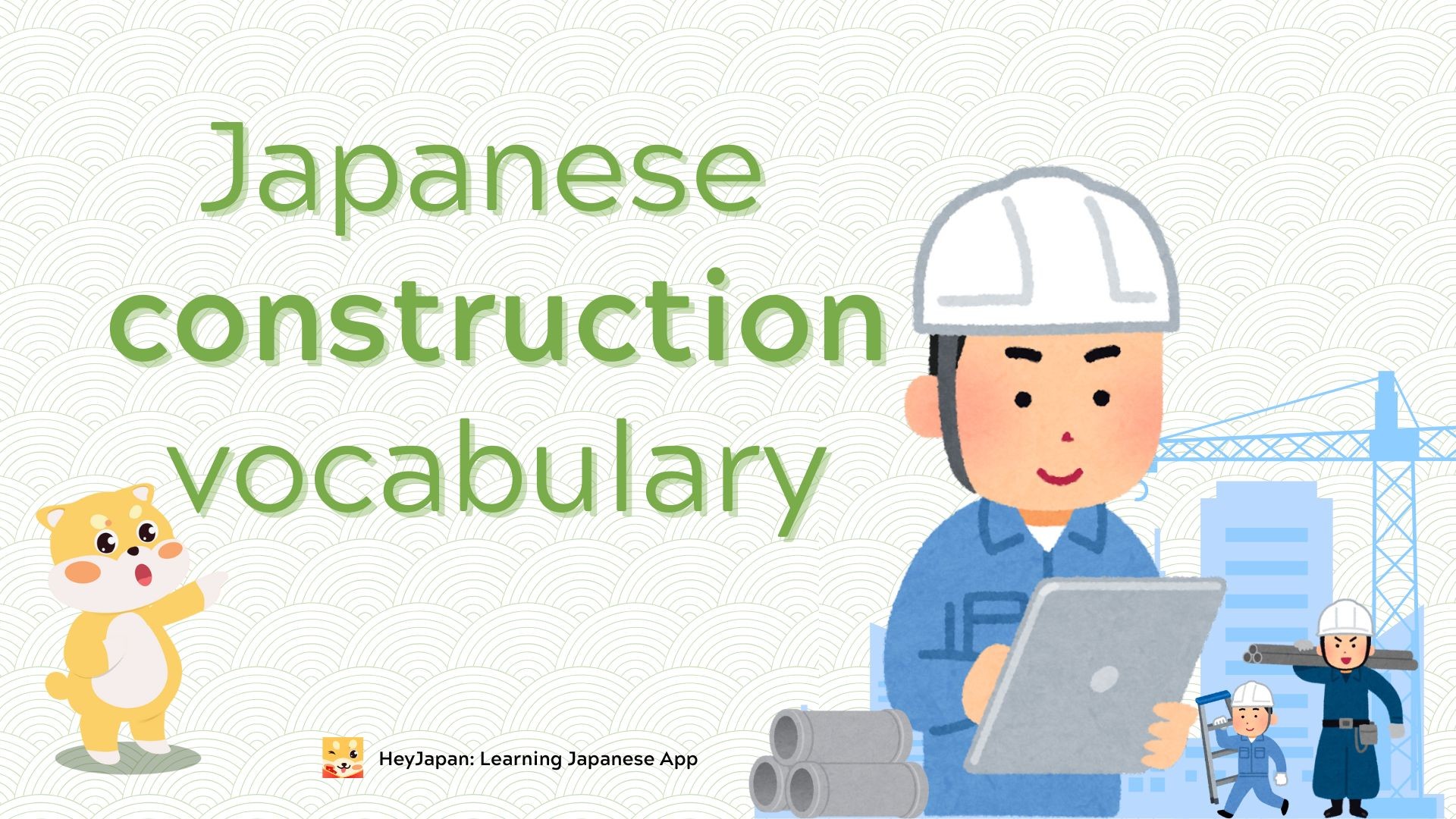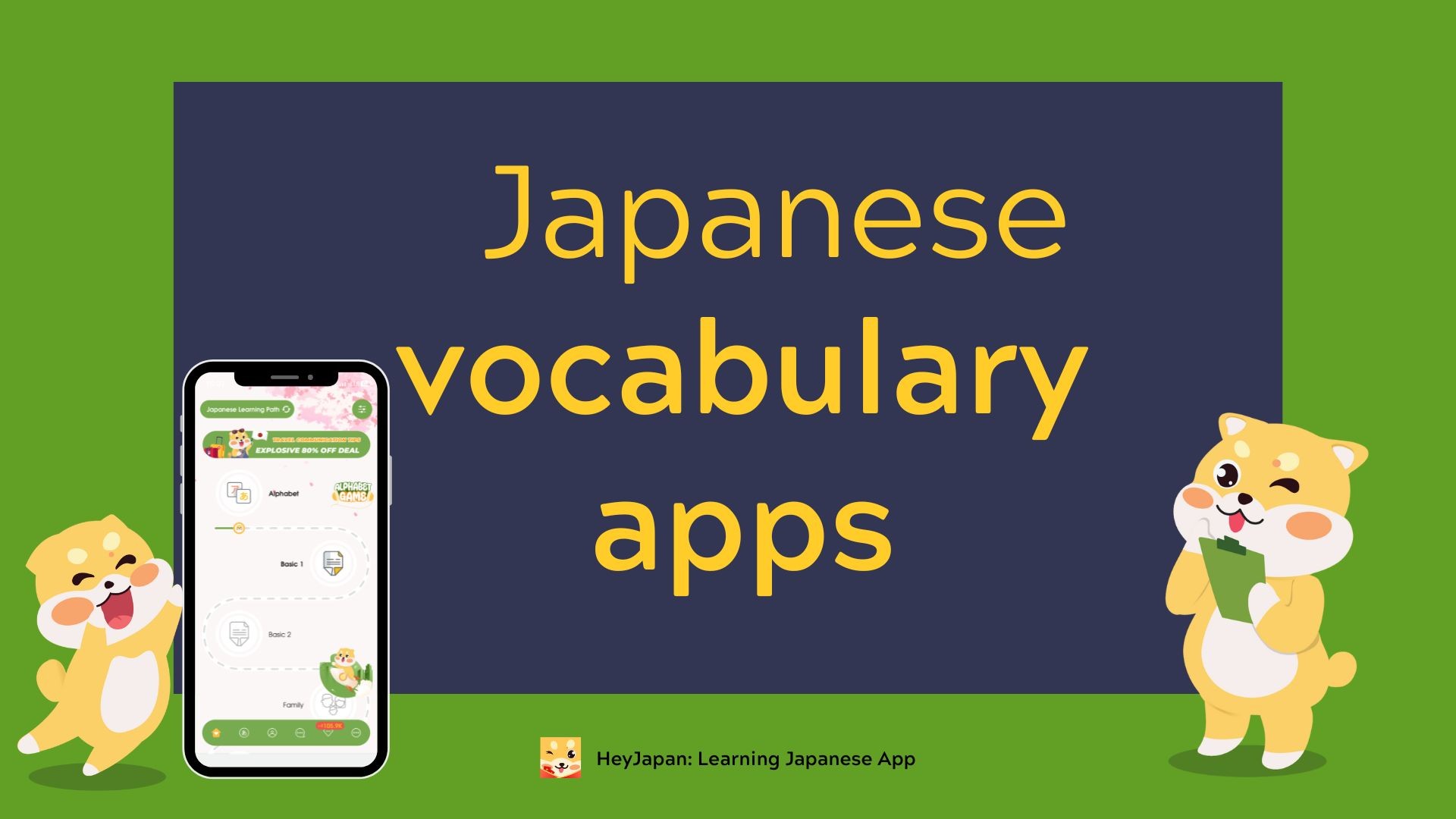- 1. おはよう (Ohayou)
- 2. おはようございます (Ohayou gozaimasu)
- 3. おっはー (Ohhā)
- 4. おはようございますございます (Ohayou gozaimasu gozaimasu)
- 5. 今朝はどうだった? (Kesa wa dou datta?)
- 6. おはよう、お疲れ様です (Ohayou, otsukaresama desu)
- 7. おはようございます、お元気ですか? (Ohayou gozaimasu, ogenki desu ka?)
- 8. おはよう〜 (Ohayou〜)
- 9. おはよ〜 (Ohayo〜)
- 10. お目覚めはどうでしたか? (Omezame wa dou deshita ka?)
- 11. 今朝もよろしくね (Kesa mo yoroshiku ne)
- 12. おはようございます、よい一日を (Ohayou gozaimasu, yoi ichinichi wo)
- 13. 朝だね (Asa da ne)
- 14. おはようさん (Ohayou-san)
- 15. おはようございます、今日はどんな感じですか? (Ohayou gozaimasu、 kyou wa donna kanji desu ka?)
1. おはよう (Ohayou)
-
Meaning: Good morning (informal)
- Usage: Used in informal situations, typically with friends, family, or people of the same age. Not appropriate for older individuals or superiors.
- Example
A: おはよう、元気だった? (Ohayou, genki datta?) – Good morning, how are you?
B: おはよう!元気だよ! (Ohayou! Genki da yo!) – Good morning! I'm good!
For more details on greetings in Japanese, check out this article 16 phrases to say “Hello” in Japanese
2. おはようございます (Ohayou gozaimasu)
-
Meaning: Good morning (polite)
- Usage: A more formal greeting used with older people, superiors, or in workplace environments.
- Example
A: おはようございます、今日もよろしくお願いします。 (Ohayou gozaimasu, kyou mo yoroshiku onegaishimasu.) – Good morning, I look forward to working with you today.
B: おはようございます。よろしくお願いします。 (Ohayou gozaimasu. Yoroshiku onegaishimasu.) – Good morning. I look forward to working with you too.
3. おっはー (Ohhā)
-
Meaning: Good morning (cute, informal)
- Usage: Commonly used among friends, close colleagues, or on social media. This greeting is informal and playful.
- Example
A: おっはー!今日はどう? (Ohhā! Kyou wa dou?) – Good morning! How’s today?
B: おっはー!元気だよ! (Ohhā! Genki da yo!) – Good morning! I’m feeling good!
Other Useful Japanese Phrases
Want to expand your vocabulary? Learn how to say "I am learning Japanese" in Japanese or explore how to learn Japanese phrases to level up your communication skills.
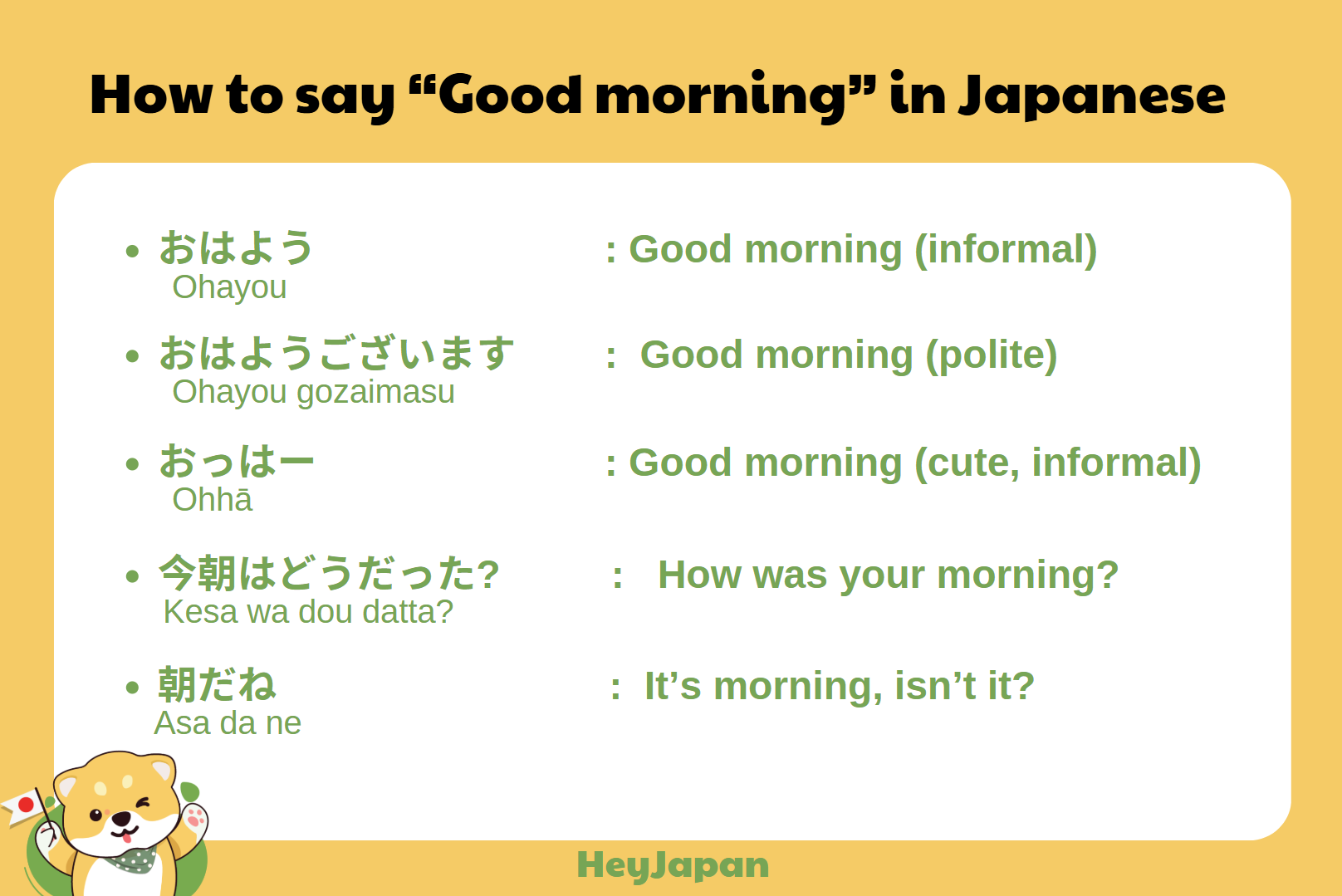
4. おはようございますございます (Ohayou gozaimasu gozaimasu)
-
Meaning: Repeated form of "Good morning" (incorrect)
- Usage: This is incorrect because repeating "gozaimasu" is unnecessary and not proper. Avoid using it.
- Example
A: おはようございますございます! (Ohayou gozaimasu gozaimasu!)
B: (Correct) おはようございます!(Ohayou gozaimasu!) – This is incorrect, don’t repeat "gozaimasu."
5. 今朝はどうだった? (Kesa wa dou datta?)
-
Meaning: How was your morning?
- Usage: This is a follow-up question after greeting someone, showing interest in their morning. It’s used in close relationships.
- Example:
A: 今朝はどうだった? (Kesa wa dou datta?) – How was your morning?
B: 今朝はとてもいい感じだったよ! (Kesa wa totemo ii kanji datta yo!) – It was really good!
Curious about other phrases? Ever wondered what does oi oi oi mean in Japanese? Discover its meaning and context in everyday language.
6. おはよう、お疲れ様です (Ohayou, otsukaresama desu)
-
Meaning: Good morning, thank you for your hard work
- Usage: Used in the workplace or among colleagues to express appreciation for someone’s efforts. It combines a greeting with gratitude.
- Example:
A: おはよう、お疲れ様です! (Ohayou, otsukaresama desu!) – Good morning, thank you for your hard work!
B: おはようございます! (Ohayou gozaimasu!) – Good morning!
7. おはようございます、お元気ですか? (Ohayou gozaimasu, ogenki desu ka?)
-
Meaning: Good morning, how are you?
- Usage: A polite greeting, showing concern for the other person's well-being. Suitable for acquaintances or colleagues.
- Example:
A: おはようございます、お元気ですか? (Ohayou gozaimasu, ogenki desu ka?) – Good morning, how are you?
B: はい、おかげさまで元気です! (Hai, okagesama de genki desu!) – Yes, thank you, I'm fine!
8. おはよう〜 (Ohayou〜)
- Meaning: Good morning (extended, casual)
- Usage: A casual and friendly way to greet someone, with the vowel sound "ou" prolonged. Typically used with close friends or family.
- Example:
A: おはよう〜! (Ohayou~!) – Good morning!
B: おはよう〜! (Ohayou~!) – Good morning!
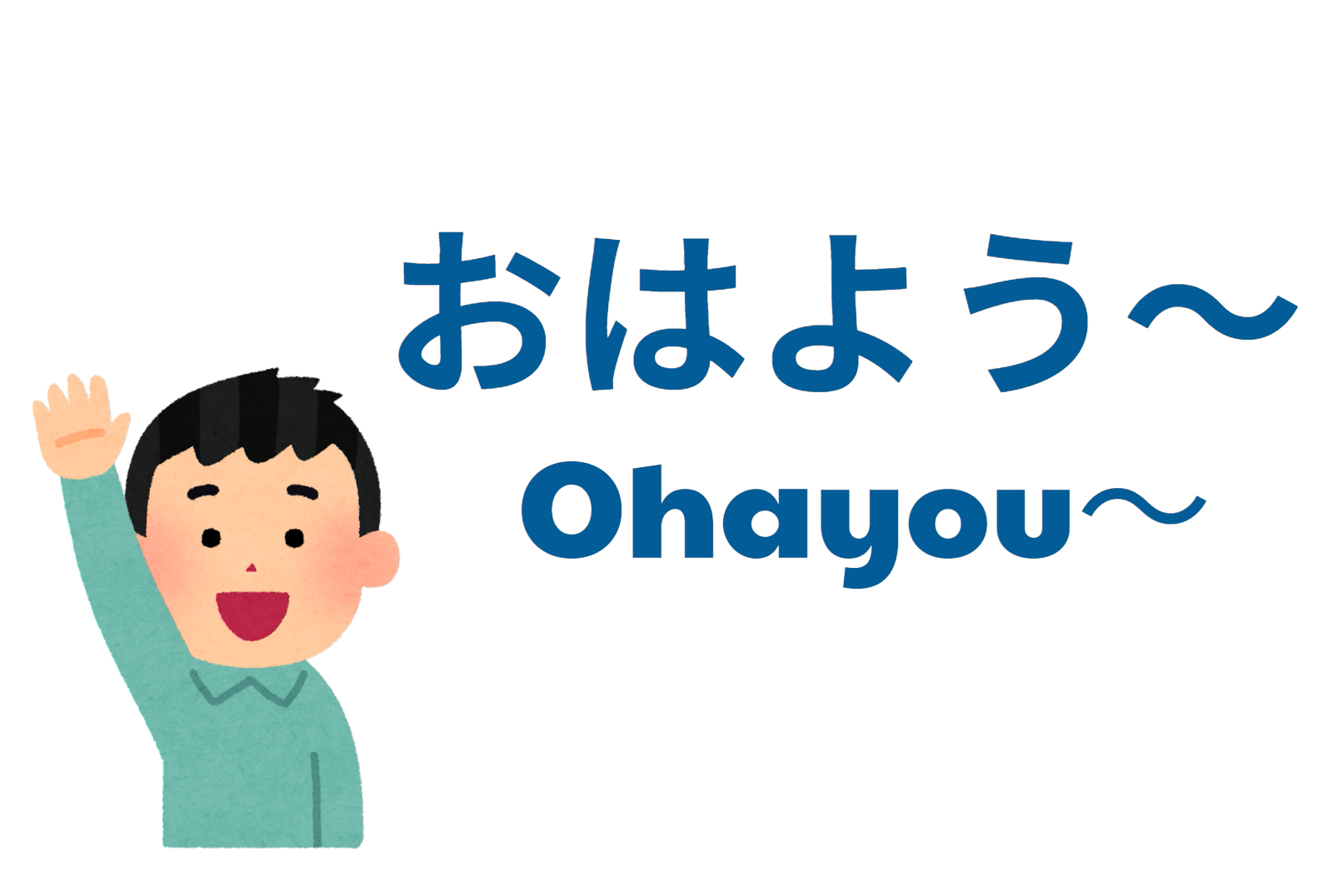
9. おはよ〜 (Ohayo〜)
-
Meaning: Good morning (cute, informal)
- Usage: A cute and informal version of "Ohayou," often used between friends or in casual situations.
- Example:
A: おはよ〜! (Ohayo~!) – Good morning!
B: おはよ〜! (Ohayo~!) – Good morning!
10. お目覚めはどうでしたか? (Omezame wa dou deshita ka?)
-
Meaning: How was your wake-up?
- Usage: Used to inquire about how someone felt after waking up. It’s a more personal way to show concern.
- Example:
A: お目覚めはどうでしたか? (Omezame wa dou deshita ka?) – How did you sleep?
B: よく寝ましたよ! (Yoku nemashita yo!) – I slept well!
11. 今朝もよろしくね (Kesa mo yoroshiku ne)
-
Meaning: Have a good day today as well
- Usage: A friendly way to wish someone a good day after greeting them in the morning, often used with friends or family.
- Example:
A: 今朝もよろしくね! (Kesa mo yoroshiku ne!) – Have a good day today!
B: はい、よろしく! (Hai, yoroshiku!) – Yes, thank you!
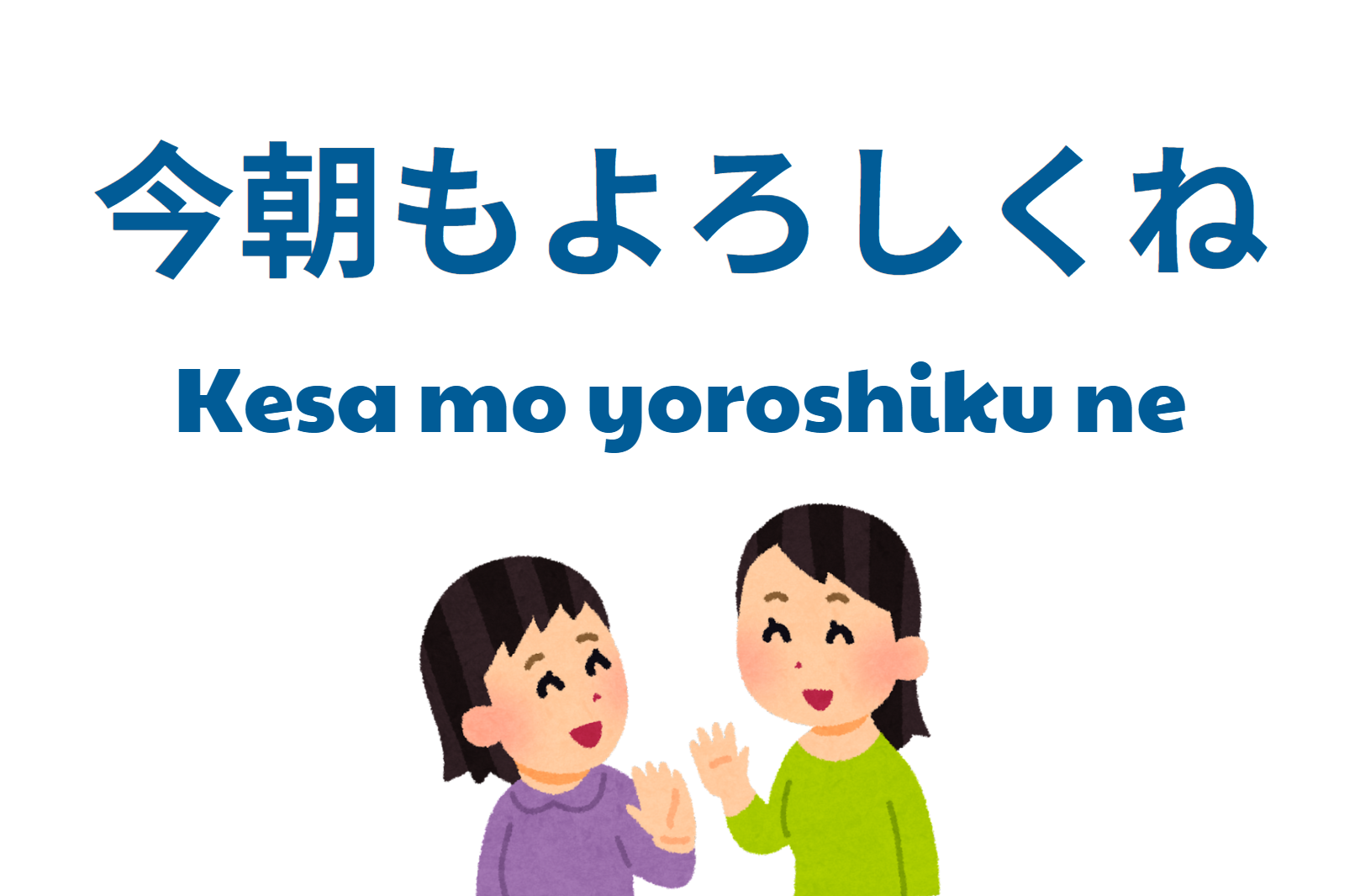
12. おはようございます、よい一日を (Ohayou gozaimasu, yoi ichinichi wo)
-
Meaning: Good morning, have a good day
- Usage: A formal, polite way to wish someone a good day, used in professional settings or with people you respect.
- Example:
A: おはようございます、よい一日を! (Ohayou gozaimasu, yoi ichinichi wo!) – Good morning, have a good day!
B: おはようございます! (Ohayou gozaimasu!) – Good morning!
13. 朝だね (Asa da ne)
- Meaning: It’s morning, isn’t it?
- Usage: A simple, informal way to acknowledge the start of the day, often used with friends or family.
- Example:
A: 朝だね! (Asa da ne!) – It’s morning, isn’t it?
B: うん、朝だね! (Un, asa da ne!) – Yeah, it’s morning!
14. おはようさん (Ohayou-san)
-
Meaning: Good morning (regional, from southern Japan)
- Usage: A regional variation of the standard greeting, common in places like Osaka. It’s informal and friendly.
- Example:
A: おはようさん! (Ohayou-san!) – Good morning!
B: おはようさん! (Ohayou-san!) – Good morning!
15. おはようございます、今日はどんな感じですか? (Ohayou gozaimasu、 kyou wa donna kanji desu ka?)
- Meaning: Good morning, how do you feel today?
- Usage: A polite and caring way to ask how someone is feeling today. Used when you want to show concern for the person’s mood or health.
- Example:
A: おはようございます、今日はどんな感じですか? (Ohayou gozaimasu, kyou wa donna kanji desu ka?) – Good morning, how do you feel today?
B: 今日も元気です! (Kyou mo genki desu!) – I feel good today!
In conclusion, knowing how to say good morning in Japanese is an essential part of mastering the language. By understanding the various ways to greet others, you can adapt to different social situations and show respect. Whether informal or formal, these greetings will help you make a positive impression in Japan




